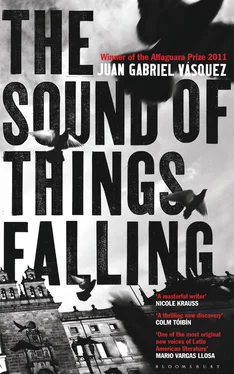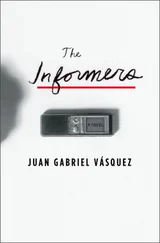‘Until you learned that I existed.’
‘Yes. Until I found that out.’
‘Well Ricardo never spoke to me about that job,’ I said. ‘Never mentioned maps or aerial photos or a twin-engine Commander.’
‘Never?’
‘Never. And not because I didn’t ask.’
‘I see,’ said Maya.
But it was obvious: she was seeing something that escaped me. In the living-room window the trees were beginning to appear, the silhouettes of their branches were beginning to detach themselves from the dark background of that long night, and also inside, around us, things recovered the lives they had during the day. ‘What do you see?’ I asked Maya. She seemed tired. We were both tired, I thought; I thought that under my eyes there would also be grey circles like the ones under Maya’s eyes. ‘Iragorri sat there the day he came,’ she said. She pointed at the empty armchair across from us, the nearest to the stereo system from which no sound was now coming. ‘He just stayed for lunch. He didn’t ask me to tell him anything in return. Or to show him my family’s papers. Much less sleep with me.’ I looked down, guessed that she was doing the same. And Maya added, ‘The truth is that you, my dear friend, are a user.’
‘Sorry,’ I said.
‘You should be ashamed of yourself.’ Maya smiled: in the dawn’s blue light I saw her smile. ‘The thing is I remember perfectly, he was sitting there and we’d just been brought some lulo juice, because Iragorri was teetotal, and he’d added a spoonful of sugar and he was stirring it like this, slowly, when we got to the thing about the cash machine. Then he told me that of course, of course he’d lent my dad that money, but he didn’t really have money to spare. So he said look, Ricardo, don’t take this the wrong way, but I have to ask you how you’re going to pay me back. When you’re going to pay me back, and how? And that’s when my dad, according to Iragorri, told him, Oh, don’t worry about that. I’ve just done a job that I’ll be getting good money for. I’m going to pay you all this back with interest.’
Maya stood up, took a couple of steps towards the rustic table her little stereo sat on and pressed rewind. The silence filled with that mechanical murmur, as monotonous as running water. ‘That sentence is like a hole, everything goes down it,’ said Maya. ‘ I’ve just done a job , my dad said to Iragorri, that I’ll be getting good money for . Not very many words, but they’re fuckers.’
‘Because we don’t know.’
‘Exactly,’ said Maya. ‘Because we don’t know. Iragorri didn’t ask me at first, he was discreet or shy, but eventually he couldn’t help it. What kind of job would it have been, Señorita Fritts? I can see him there, looking away. See that piece of furniture, Antonio?’ Maya pointed to a wicker structure with four shelves. ‘See the pre-Columbian pieces up top?’ There was a little man sitting cross-legged with an enormous phallus; at his side, two pots with heads and prominent bellies. ‘Iragorri stared at them up there, far from my eyes, he couldn’t look at me as he said what he said, he didn’t dare. And what he said was: Your dad wouldn’t have been mixed up in something fishy? Fishy like what? I asked. And he, looking up there the whole time, looking at the pre-Columbian figurines, blushed like a child and said, well, I don’t know, it doesn’t matter, what does it matter now. And you know what, Antonio? That’s what I think too: what does it matter any more?’ The murmur of the tape player stopped then. ‘Shall we listen to it again?’ said Maya. Her finger pressed a button, the dead pilots began to chat again in the distant night, in the middle of the night sky, at an altitude of 32,000 feet, and Maya Fritts came back to my side and put a hand on my leg and rested her head on my shoulder and I could smell her hair in which I could still detect the previous day’s rain. It wasn’t a clean smell, but I liked it, I felt comfortable with it. ‘I have to go,’ I said then.
‘Are you sure?’
‘I’m sure.’
I stood up, looked out the big window. Outside, behind the hills, the white stain of the sun was coming up.
There is just one direct route between La Dorada and Bogotá, just one way to make this journey without unnecessary detours or delays. It’s the one used by all the transport, produce, merchandise and passengers too, for those companies rely on covering the distance in the shortest possible space of time, and that’s also why a mishap on the only route can be very damaging. You turn south and take the straight road that runs by the river that takes you to Honda, the port where travellers used to arrive when no planes flew over the Andes. From London, from New York, from Havana, Colón or Barranquilla, they would arrive by sea at the mouth of the Magdalena, and change ship there or sometimes carry on in the same one. There followed long days of sailing upriver on tired steamships, which in the dry season, when the water level fell so low that the riverbed emerged, would get stranded on the banks between crocodiles and fishing boats. From Honda each traveller would get to Bogotá however they could, by mule or by train or in a private car, depending on the era and the resources, and that last leg could also take a while, from several hours to several days, for it’s not easy to go, in barely 100 kilometres, from sea level to an altitude of 2,600 metres where that grey-skyed city rests. So far in my life no one has been able to explain convincingly, beyond banal historical causes, why a country should choose as its capital its most remote and hidden city. It’s not our fault that we bogotanos are stuffy and cold and distant, because that’s what our city is like, and you can’t blame us for greeting strangers warily, for we’re not used to them. I, of course, can’t blame Maya Fritts for having left Bogotá when she got the chance, and more than once I’ve wondered how many people of my generation had done the same, escaped, not to a tropical lowland town like Maya had, but to Lima or Buenos Aires, to New York or Mexico, to Miami or Madrid. Colombia produces fugitives, that’s true, but one day I’d like to find out how many of them were born as Maya and I were at the beginning of the 1970s, how many like Maya or like me had a calm or protected or at least unperturbed childhood, how many traversed their teenage years and fearfully became adults while the city around them sank into fear and the sound of gunshots and bombs without anyone having declared any war, or at least not a conventional war, if such a thing exists. That’s what I’d like to know, how many left my city feeling in one way or another that they were saving themselves, and how many felt that by saving themselves they were betraying something, turning into proverbial rats fleeing the proverbial ship by the act of fleeing the city in flames. I shall tell you that one day I saw burning between the night / a crazy city haughty and populous, says a poem by Aurelio Arturo. I, unblinking, watched it collapse, / fall, like a rose petal under a hoof . Arturo published that in 1929: he had no way of knowing what would later happen to the city of his dream, the way Bogotá would adapt itself to his lines, entering into them and fulfilling their requisites, as iron adapts to its mould, yes, as molten iron always fills the mould it’s poured into.
It burned like a thigh between forests of fire,
and cupolas were falling and walls fell
over the beloved voices as over wide mirrors
. . ten thousand shrieks of pure brilliance.
The beloved voices. I was thinking of them that strange Monday, when after the weekend at Maya Fritts’s house, I found myself coming into Bogotá from the west, passing under the planes taking off from El Dorado Airport, passing over the river, and then driving up 26th Street. It was just after ten in the morning and the trip had gone without mishaps or collapses or traffic jams or accidents that would have held me up on a road so narrow in places that vehicles had to take it in turns to pass. I was thinking through everything I’d heard over the weekend and about the woman who had told it to me, and also about what I’d seen at the Hacienda Nápoles, whose cupolas and walls were falling down too, and also, of course, I was thinking about Arturo’s poem and about my family, my family and Arturo’s poem, my city and the poem and my family, the beloved voices of the poem, Aura’s voice and Leticia’s voice, which had filled my recent years, which in more than one sense had rescued me.
Читать дальше












